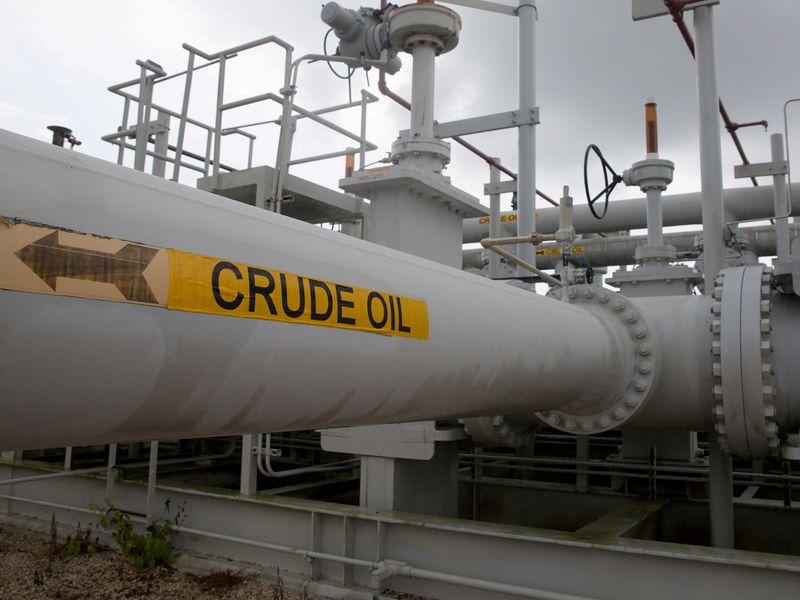
© Reuters. FILE PHOTO: A maze of crude oil pipes and valves is pictured during a tour by the Department of Energy at the Strategic Petroleum Reserve in Freeport, Texas, U.S. June 9, 2016. REUTERS/Richard Carson/File Photo
By Timothy Gardner
WASHINGTON (Reuters) -The United States said on Tuesday it will release millions of barrels of oil from strategic reserves in coordination with China, India, South Korea, Japan and Britain, to try to cool prices after OPEC+ producers repeatedly ignored calls for more crude.
U.S. President Joe Biden, facing low approval ratings amid rising inflation ahead of next year’s congressional elections, has grown frustrated at repeatedly asking the Organization of the Petroleum Exporting Countries and its allies, known as OPEC+, to pump more oil without getting any response.
prices recently touched seven-year highs and although they are still some way short of levels reached between 2011 and 2014, when they broke through $100 a barrel, many consumers are feeling the pain of a dramatic increase from a year ago.
The U.S. announcement was for a release of 50 million barrels, the equivalent of about two and a half days of U.S. demand. India, meanwhile, said it would release 5 million barrels, while Britain said it would allow the voluntary release of 1.5 million barrels of oil from privately held reserves.
Details on the amount and timing of the release of oil from South Korea, Japan and China were not announced. Seoul said it would decide after discussions with the United States and other allies. And Japanese media said Tokyo would detail its plans on Wednesday.
Officials said it was the first time that the United States had coordinated such a move with some of the world’s largest oil consumers.
OPEC+, which includes Saudi Arabia and other U.S. allies in the Gulf, as well as Russia, has rebuffed requests to pump more at its monthly meetings. It meets again on Dec. 2 to discuss policy but has so far shown no indication it will change tack.
The group has been struggling to meet existing targets https://www.reuters.com/markets/europe/us-wants-more-oil-opec-cant-turn-tap-much-harder-2021-11-23 under its agreement to gradually increase production by 400,000 barrels per day (bpd) each month – a pace Washington sees as too slow – and it remains worried that a resurgence of coronavirus cases could once again drive down demand.
Recent high oil prices have been caused by a sharp rebound in global demand, which cratered early in the pandemic in 2021, and analysts have said that releasing reserves may not be enough to curb further rises.
“Its not large enough to bring down prices in a meaningful way and may even backfire if it prompts OPEC+ to slow the pace at which it is raising output,” said Caroline Bain, chief commodities economist at Capital Economics Ltd.
Benchmark was trading above $80 a barrel on Tuesday, up from its levels before the announcement but still well below last month’s three-year high of more than $86. [O/R]
TALKING WITH PARTNERS
The release from the U.S. Strategic Petroleum Reserve would be a combination of a loan and a sale to companies, U.S. officials said. The 32 million barrels loan will take place over the next several months, while the administration would accelerate a sale of 18 million barrels already approved by Congress to raise funds for the budget.
“We will continue talking to international partners on this issue. The president stands ready to take additional action if needed, and is prepared to use his full authorities working in coordination with the rest of the world,” a senior U.S. administration official told reporters.
An OPEC+ source and several market analysts said the release was not as big as the headline figure suggested. They said Britain and India were releasing modest amounts and the United States had already announced some releases, and so the additional quantity was less than expected.
But the effort by Washington to team up with major Asian economies to lower energy prices sends a warning to OPEC and other big producers that they need to address concerns about high crude prices, up more than 50% so far this year.
COMPLICATION
Suhail Al-Mazrouei, energy minister of the United Arab Emirates, one of OPEC’s biggest producers, said before details of the release from U.S. reserves was announced that he saw “no logic” in lifting UAE supply for global markets.
An OPEC+ source said releasing reserves would complicate calculations for OPEC+, as it monitors the market on a monthly basis.
“These developments point to a period of heightened political tensions between the world’s biggest consumers and OPEC+, which implies increased oil price volatility,” said Henning Gloystein at Eurasia Group.
The United States historically has worked on coordinated stocks releases with the Paris-based International Energy Agency (IEA), a bloc of 30 industrialised energy consuming nations.
Japan and South Korea are IEA members. China and India are only associate members.
Under a swap from U.S. reserves, oil companies taking crude must return it – or the refined product – plus interest. Swaps are typically offered when oil firms face supply disruptions, such as a pipeline outage or damage from a hurricane.
Outright sales are less common. U.S. presidents have authorized emergency sales three times, most recently in 2011 during a war in OPEC member Libya. Sales also took place during the Gulf War in 1991 and after Hurricane Katrina in 2005.
Stay connected with us on social media platform for instant update click here to join our Twitter, & Facebook
We are now on Telegram. Click here to join our channel (@TechiUpdate) and stay updated with the latest Technology headlines.
For all the latest Business News Click Here
For the latest news and updates, follow us on Google News.
